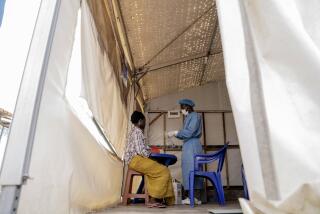Prairie Dogs May Have Passed Monkeypox to People
MADISON, Wis. — A virus related to smallpox that has never been detected in the Western Hemisphere may be the cause of a mysterious disease spreading from pet prairie dogs to people across the upper Midwest, health officials said Saturday.
Dr. James Hughes, director of the National Center for Infectious Diseases at the Centers for Disease Control and Prevention, said a group of prairie dogs sold through a suburban Chicago pet distributor appears to be infected with the monkeypox virus, a less deadly member of the same viral family that causes smallpox.
Monkeypox typically has been found in West African rain forests, Hughes said. The death rate among infected humans has ranged from 1% to 10%.
Hughes said that although monkeypox is spread primarily through rodents in Africa, scientists haven’t ruled out person-to-person transmission.
“We’re in the very early stages of classifying this virus,” he said. “We’re not certain.”
Since early May, about 17 possible cases have been reported in Wisconsin in people as young as 4 and as old as 48. One possible case has been reported in Illinois and one has been reported in Indiana, health officials from all three states said.
The victims appeared to have been exposed to prairie dogs -- rodents whose popularity as pets has grown in recent years. Those affected reported fever, coughs, rashes and swollen lymph nodes.
CDC and state health officials are still researching the disease with samples from the infected prairie dogs and humans, but the virus appears susceptible to the antiviral drug Cidofovir, Hughes said. He isn’t aware of any long-term aftereffects of monkeypox.
No one has died or become severely ill in the current outbreak, Hughes said. But four people in Wisconsin had to be hospitalized at Froedtert Memorial Lutheran Hospital, hospital spokesman Mark McLaughlin said. Two remained hospitalized in satisfactory condition Saturday.
Investigators have traced the origin of the outbreak to a pet distributor in Villa Park, Ill. That distributor had a giant Gambian rat, indigenous to African countries, that may have infected batches of prairie dogs, Hughes said.
SK Exotics, a South Milwaukee pet distributor, bought prairie dogs from the Villa Park distributor and imported them to Wisconsin.
Two pet stores, Hoffer TropicLife Pets in Milwaukee and Rainbow Pets in Shorewood, a Milwaukee suburb, bought some of the prairie dogs from SK Exotics.
More prairie dogs from Villa Park found their way to northern Wisconsin through a Wausau swap meet, said Dr. Mark Wegner, chief of the Wisconsin Communicable Disease Epidemiology Section.
Wisconsin agriculture officials have taken several emergency steps since word of the outbreak got out last week.
The state Department of Health and Family Services issued an emergency order Friday banning the sale, importation and display of prairie dogs.
Also Friday, acting state veterinarian Dr. Robert Ehlenfeldt imposed quarantines on SK Exotics, Hoffer TropicLife Pets, Rainbow Pets and a private home in Dorchester that is reported to sell animals to swap meets.
The quarantines prohibit movement of any prairie dogs or mammals that come in contact with them.
“I wouldn’t want to do it any other way than to follow the rules and find out exactly what’s going on,” said Eileen Whitmarsh, co-owner of Rainbow Pets.
Calls left at the private home and Hoffer TropicLife Pets were not returned. No listing could be found for SK Exotics.
Whitmarsh said she got two female prairie dogs from SK Exotics on May 5. Neither looked sick at first, she said, but one eventually began to look tired.
She said the store immediately quarantined them. SK Exotics took them back on May 12, she said.
Whitmarsh said she got sick in mid-May with blisters, coughing and a 101-degree fever. Hospital staff gave her aspirin and told her it was a viral infection, and she went home, she said.
Whitmarsh said she didn’t feel better and ended up going to West Allis Memorial Hospital five days later, where she was given antibiotics. She finally felt better around Memorial Day, she said.
Meanwhile, state and federal investigators are still trying to track down animals sold from the Villa Park distributor. The source of the Gambian rat is still unknown, they said.
More to Read
Sign up for Essential California
The most important California stories and recommendations in your inbox every morning.
You may occasionally receive promotional content from the Los Angeles Times.









